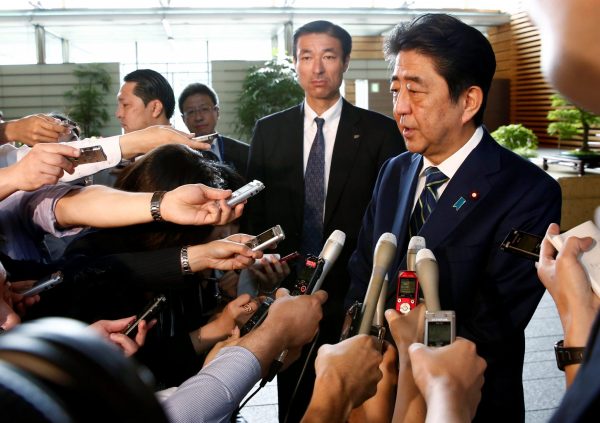The private educational institution — which was already known for running a nationalist kindergarten with a pre-war ideology — had been able to buy state-owned land for only 14 per cent of its officially evaluated price to build a primary school and had appointed the prime minister’s wife Mrs Akie Abe as honorary principal.
This was followed by the Kake Gakuen scandal to establish a new veterinarian school in Shikoku. It aimed to break the existing monopoly of veterinarian schools by extant universities. But when it became known that Kake Gakuen President Kotaro Kake was a lifelong friend of Prime Minister Abe, the media and opposition parties began speculating that the choice of Kake as educational provider may have been a special favour from Abe to Kake. Abe flatly denied this, but in the June–July period, parliamentary debate and media attention was directed at the Moritomo and Kake scandals.
Finally, there have been the criticisms of former defence minister Tomomi Inada, who was said to be one of Abe’s most trusted political colleagues because of their shared ideology. Most notable among criticisms of Inada were the leaks from the Defense Ministry that their leadership decided to deny the existence of daily reports sent by soldiers in South Sudan because their description of the situation was ‘too dangerous’ for Japan’s Self-Defense Force.
The resulting public anger was directed not only at the scandals themselves but also at the self-righteous behaviour of Abe and his entourage when they failed to humbly explain what really took place. Hence, Abe subsequently began expressing that the government should face public criticism with sincerity and humility, and due measures were taken with respect to each of the above issues.
The composition of Abe’s new cabinet which was announced on 3 August amplified Abe’s message of humility and flexibility. The choice of a powerful negotiator from centrist faction Taro Kono and former rival Seiko Noda most symbolically showed this move. Following the reshuffle, public opinion polls returned to their prior level of 30 per cent.
Abe will hopefully now be able to concentrate his energy on tackling the critical foreign policy issues which amassed during the domestic scandals.
First, there is the growing issue of North Korea. Kim Jong-un may have obtained the capability to launch intercontinental ballistic missiles, and his mutual rebukes with US President Trump have mounted sharply. If armed conflict brakes out, Japan might become a target of North Korea’s missile attacks. Abe has consistently argued that ‘now is the time for pressuring North Korea’. But if ‘pressure’ fails, then what next?
At some point, Abe is bound to change course and push for dialogue. Paradoxically, since Abe’s public message has been so constant, his shift of course toward a well-calculated dialogue may produce tangible results. But amidst the domestic drama, are Abe and his security team preparing enough so as not to miss that critical point?
Second, there is the ongoing dispute between Japan and Russia over the Northern Territories/southern Kuril Islands. A road-map for progress was established during Putin’s visit to Japan in late 2016, requiring expedited implementation of that road-map in 2017. But we now see some slow-down of its implementation. Furthermore, in June 2017, Putin publicly expressed concerns that the US–Japan security arrangement may obstruct Russia’s security position. Abe’s domestic distractions might have prevented him from assuaging Putin’s national security misgivings, and if so, Japan and Russia are missing a historic window of opportunity for the improvement of their relationship.
Third, there is bound to be some re-emergence of the comfort women issue with South Korea. But although South Korean President Moon Jae-in has reportedly told Abe that the ‘majority of Korean people psychologically are not able to accept the December 2015 comfort women agreement’, he did not refer to re-negotiation. He proposed to resume shuttle diplomacy and this proposal apparently was warmly accepted.
But Moon has begun moving in a different direction as well. On 17 August, Moon gave the first instance of the South Korean government support to the Supreme Court verdict that the ‘civil right to sue companies which employed ‘forced labourers’ remains valid’. This may well contradict long-standing South Korean government’s position that ‘the 1965 grant assistance from Japan should be considered as including compensation to ‘forced labourers’’. Now that the Pandora’s box has been opened, it is difficult to see how this issue is going to be handled.
It is not easy to tell which foreign–security policy issue Abe will take up, but domestic dalliances cannot continue to interrupt Japan’s foreign policy challenges, lest Japan’s international position be sacrificed to surmountable domestic strife.
Kazuhiko Togo is the Director of the Institute of World Affairs and Professor of International Politics at Kyoto Sangyo University. He was formerly Ambassador of Japan to the Netherlands.


The author fails to note that these so called ‘domestic dalliances’ by Abe and his LDP cohorts could well be a reflection of a larger, more longstanding arrogant refusal on his part to attend to the wishes of the electorate. I refer to such things as Abe’s decision to restart nuclear power plants after the so called Triple Disaster and to ‘reinterpret’ the Constitution. A clear majority of voters in Japan did not want the country to return to its reliance on nuclear power after the events in Fukushima in 2011. And a clear majority did not want Abe to move the country towards so called ‘collective self defense.’
Time will tell whether his recent Cabinet shuffle will overcome these more recent episodes of arrogant, poor judgment. Or will these become the proverbial ‘straw that breaks the (LDP’s) camel’s back’ politically speaking?
Currently (13 Sept) the Yomiuri is putting support for Abe at 50% and NHK at 44% even though the domestic issues cited in this article are still unresolved.